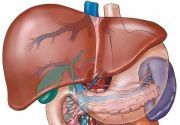Article
Combination Treatment with Sofosbuvir plus Ledipasvir Highly Effective After Only Eight Weeks
Author(s):
Treatment with an 8-week regimen of combination sofosbuvir plus ledipasvir with or without ribavirin produced sustained virologic response rates (SVR) similar to those achieved with a 12-week regimen in non-cirrhotic, previously untreated, genotype 1 hepatitis C patients, according to results from the ION-3 trial.

Treatment with an 8-week regimen of combination sofosbuvir plus ledipasvir with or without ribavirin produced sustained virologic response rates (SVR) similar to those achieved with a 12-week regimen in non-cirrhotic, previously untreated, genotype 1 hepatitis C patients, according to results from the ION-3 trial.
The study results were presented Monday by Stuart C. Gordon, MD, at Digestive Disease Week 2014 in Chicago, IL.
Patients in the 8-week sofosbuvir plus ledipasvir group achieved an SVR of 94%, only 1 point lower than the 12-week group (97.5% CI, −4 to 6). The group that received 8 weeks of sofosbuvir plus ledipasvir with ribavirin achieved a 93% SVR (95% CI, −6 to 4).
“There was no significant difference between the groups with or without ribavirin and there was no significant difference with the addition of 4 weeks of treatment,” Gordon said.
All three sofosbuvir plus ledipasvir regimens were safe and were well tolerated in the open-label, phase 3 study, which was designed to test the safety and efficacy of a fixed-dose combination of sofosbuvir (SOF) 400 mg / ledipasvir (LDV) 90 mg with or without ribavirin (RBV).
Patients were randomized 1:1:1 to receive SOF/LDV±RBV for 8 weeks or SOF/LDV for 12 weeks. Randomization was stratified by HCV subtype. The primary endpoint was SVR12.
Of 647 patients, 58% were male, 78% were white, 75% carried the non-CC IL28B allele, and 80% had genotype 1a infection. Gordon said the study had broad inclusion, with no upper limits on BMI or age. The mean age was in the early 50s in all three groups.
Adverse events were uncommon and were mild—primarily fatigue, nausea and headache. The incidence of adverse events was lower among patients receiving ledipasvir—sofosbuvir alone (67% and 69% of patients receiving 8 weeks and 12 weeks of treatment, respectively) than among the group getting 8 weeks of ledipasvir–sofosbuvir plus ribavirin (76%).
Sofosbuvir was approved by the FDA in December 2013 for clinical use in the US. Ledipasvir is not FDA-approved. Given the results of the ION-1, ION-2, and ION-3 trials, Gilead Sciences has requested priority review for the fixed-dose combination of sofosbuvir plus ledipasvir for genotype 1 HCV patients and the FDA has set a ruling date of October 10, 2014.
Approximately 75 percent of people infected with HCV in the US have the genotype 1 strain of the virus.
As to whether the dramatic results mean treatment might be effective at an even shorter duration than eight weeks, Gordon said, “There was actually a study presented at the EASL (European Association for the Study of the Liver) 2014 annual meeting a few weeks ago that looked at a shorter duration of six weeks and the SVR rates were diminished in the range of about 67% with a higher relapse rate, suggesting that this particular regimen is not going to go to a shorter duration.”




